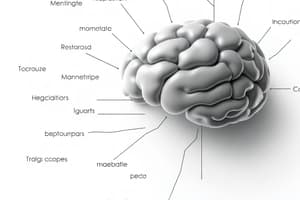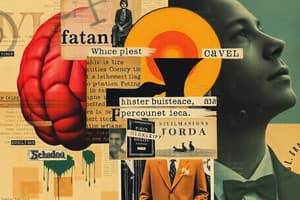Podcast
Questions and Answers
What is learning?
What is learning?
- A simple reflex action
- A temporary change in behavior
- A process without any influence from experience
- A relatively permanent change in behavior due to experience (correct)
Define habituation.
Define habituation.
An organism's decreasing response to a stimulus with repeated exposure to it.
What is associative learning?
What is associative learning?
Learning that certain events occur together.
What type of learning involves linking two or more stimuli?
What type of learning involves linking two or more stimuli?
What is behaviorism?
What is behaviorism?
What is the unconditioned response (UR)?
What is the unconditioned response (UR)?
What does conditioned response (CR) refer to?
What does conditioned response (CR) refer to?
Define unconditioned stimulus (US).
Define unconditioned stimulus (US).
What is a conditioned stimulus (CS)?
What is a conditioned stimulus (CS)?
What is acquisition in classical conditioning?
What is acquisition in classical conditioning?
Define higher-order conditioning.
Define higher-order conditioning.
What does extinction mean in classical conditioning?
What does extinction mean in classical conditioning?
What is spontaneous recovery?
What is spontaneous recovery?
What is generalization in classical conditioning?
What is generalization in classical conditioning?
Define discrimination in classical conditioning.
Define discrimination in classical conditioning.
What is respondent behavior?
What is respondent behavior?
What is operant conditioning?
What is operant conditioning?
What is learned helplessness?
What is learned helplessness?
Define operant behavior.
Define operant behavior.
What does the law of effect state?
What does the law of effect state?
What is an operant chamber?
What is an operant chamber?
What is shaping in operant conditioning?
What is shaping in operant conditioning?
What is a discriminative stimulus?
What is a discriminative stimulus?
Define reinforcer.
Define reinforcer.
What is positive reinforcement?
What is positive reinforcement?
Flashcards are hidden until you start studying
Study Notes
Learning Concepts
- Learning is a lasting change in behavior resulting from experience.
- Habituation refers to a decrease in response to a stimulus after repeated exposure.
- Associative learning involves linking events, whether it's two stimuli or a response to its consequences.
Classical Conditioning
- Classical conditioning links multiple stimuli and allows anticipation of events.
- Unconditioned stimulus (US) triggers an automatic response, while the unconditioned response (UR) is the natural reaction to the US.
- Conditioned stimulus (CS) is initially neutral but becomes associated with the US, leading to a conditioned response (CR).
- Acquisition is the initial learning phase where a neutral stimulus and US are paired, leading to the CR.
Conditioning Processes
- Higher-order conditioning involves pairing a neutral stimulus with a previously conditioned stimulus to create a second conditioned stimulus.
- Extinction occurs when the US no longer follows the CS, weakening the conditioned response.
- Spontaneous recovery is the reappearance of an extinguished CR after a pause.
Generalization and Discrimination
- Generalization is the tendency to respond similarly to stimuli that are similar to the conditioned stimulus.
- Discrimination is the learned ability to differentiate between the conditioned stimulus and other stimuli that do not signal a US.
Behavior Types
- Respondent behavior is an automatic reaction to a stimulus.
- Operant conditioning strengthens behaviors through reinforcement or weakens them via punishment.
Key Theories in Operant Conditioning
- Learned helplessness is the state of passivity in animals or humans that occurs when they cannot escape aversive situations.
- Operant behavior actively operates on the environment to produce effects.
- The law of effect posits that favorable consequences increase behavior likelihood, while unfavorable consequences decrease it.
Research Tools and Techniques
- The operant chamber (Skinner box) is a device used to measure the frequency of operant behaviors by providing reinforcers.
- Shaping involves guiding behavior towards the desired outcome through successive approximations.
- Discriminative stimuli signal the potential for reinforcement, prompting specific responses.
Reinforcement and Its Effects
- A reinforcer is any event that enhances the behavior it follows.
- Positive reinforcement boosts behaviors by presenting desirable outcomes.
Studying That Suits You
Use AI to generate personalized quizzes and flashcards to suit your learning preferences.




